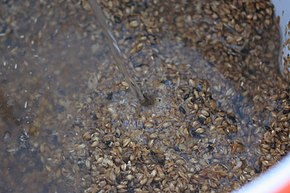
Back Moaschn BAR Майшуване Bulgarian Maischen German خیساندن مالت Persian Mäskäys Finnish Mesking Icelandic Ammostamento Italian Maischen Dutch Brassagem Portuguese Drozganje Slovenian

In brewing and distilling, mashing is the process of combining ground grain – malted barley and sometimes supplementary grains such as corn, sorghum, rye, or wheat (known as the "grain bill") – with water and then heating the mixture. Mashing allows the enzymes in the malt (primarily, α-amylase and β-amylase) to break down the starch in the grain into sugars, typically maltose to create a malty liquid called wort.[1]
The two main methods of mashing are infusion mashing, in which the grains are heated in one vessel, and decoction mashing, in which a proportion of the grains are boiled and then returned to the mash, raising the temperature.[2]
Mashing involves pauses at certain temperatures (notably 45–62–73 °C or 113–144–163 °F) and takes place in a "mash tun" – an insulated brewing vessel with a false bottom.[3][4][5]
- ^ Cite error: The named reference
Ensminger1994was invoked but never defined (see the help page). - ^ Cite error: The named reference
Rabin1998was invoked but never defined (see the help page). - ^ "Abdijbieren. Geestrijk erfgoed" by Jef Van den Steen
- ^ "Bierbereiding". 2008-04-19. Archived from the original on 2008-04-19. Retrieved 2018-11-04.
- ^ "How To Brew Your First Beer: Chapter 14 - How the Mash Makes Wort". www.realbeer.com. Retrieved 2018-11-04.